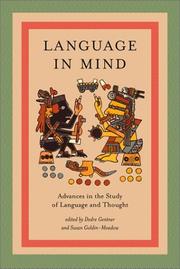| Listing 1 - 8 of 8 |
Sort by
|

ISBN: 0299127044 Year: 1990 Publisher: Madison, Wis. University of Wisconsin Press
Abstract | Keywords | Export | Availability | Bookmark
 Loading...
Loading...Choose an application
- Reference Manager
- EndNote
- RefWorks (Direct export to RefWorks)
Psycholinguistics --- Sociolinguistics --- Whorf, B. --- Bakhtin, Michael M. --- Sapir-Whorf (Hypothese de ) --- Sapir-Whorf hypothese --- Sapir-Whorf hypothesis --- Sapir-Whorf hypothesis. --- Bakhtin, Mikhail Mikhaïlovich --- Whorf, Benjamin Lee, 1897-1941. --- Bakhtin, M. M. (Mikhail Mikha ilovich), 1895-1975. --- Whorf, Benjamin Lee
Book
ISBN: 9789000311316 9000311314 Year: 2012 Publisher: Houten Spectrum
Abstract | Keywords | Export | Availability | Bookmark
 Loading...
Loading...Choose an application
- Reference Manager
- EndNote
- RefWorks (Direct export to RefWorks)
Karel V sprak ooit de woorden: 'Ik spreek Spaans tot mijn God, Italiaans tegen de vrouwen, Frans tegen de mannen en Duits tegen mijn paard. ' De onderliggende these dat verschillende talen in verschillende omstandigheden niet even goed te gebruiken zijn, wordt ook tegenwoordig nog breed gedragen.Guy Deutscher daagt ons, in een prikkelende, toegankelijke en humoristische stijl, uit om te onderzoeken of de taal inderdaad effect heeft op ons wereldbeeld. Hij neemt de lezer mee op een ontdekkingsreis door de tijd en over de hele wereld en gaat in op de vraag of de taal ons een spiegel verschaft voor onze culturele omgeving. Kan deze these wetenschappelijk onderbouwd worden ? Zijn alle talen even complex ?Of spreken primitieve volken primitieve talen? Ziet onze wereld, wanneer men deze in andere talen beschrijft, er ook anders ui t?Bron : http://www.unieboekspectrum.nl
Sapir-Whorf hypothesis --- Culture --- Linguistics --- Historical linguistics --- Taal --- Taalgebruik --- Communicatie --- Communicatiemiddelen --- 81 --- Cultuur --- Communicatiemiddel --- Therapie --- Kleuter --- Geschiedenis --- Spraaktechnologie --- Cultuur. --- Historical linguistics. --- Sapir-Whorf-hypothese. --- Taal.
Book
ISBN: 3825223191 3772029825 9783772029820 9783825223199 Year: 2002 Volume: 2319S Publisher: Tübingen: Francke,
Abstract | Keywords | Export | Availability | Bookmark
 Loading...
Loading...Choose an application
- Reference Manager
- EndNote
- RefWorks (Direct export to RefWorks)
Philosophy of language --- Sapir-Whorf hypothesis --- Language and languages --- Sapir-Whorf, Hypothèse de --- Langage et langues --- Philosophy --- Philosophie --- Sapir-Whorf, Hypothèse de
Book
ISBN: 0631165924 9780631165927 Year: 1990 Volume: 15 Publisher: Oxford : Blackwell,
Abstract | Keywords | Export | Availability | Bookmark
 Loading...
Loading...Choose an application
- Reference Manager
- EndNote
- RefWorks (Direct export to RefWorks)
Grammar --- Sociolinguistics --- Langage -- Aspects sociaux --- Langage -- Sociologie --- Langage et société --- Language and languages -- Social aspects --- Language and languages -- Sociological aspects --- Language and society --- Langues -- Aspects sociaux --- Langues -- Sociologie --- Sapir-Whorf (Hypothese de ) --- Sapir-Whorf hypothese --- Sapir-Whorf hypothesis --- Society and language --- Sociolinguistique --- Sociolinguïstiek --- Sociologie des langues --- Sociologie du langage --- Sociology of language --- Société et langage --- Language and languages --- Language and culture --- Linguistics --- Sociology --- Integrational linguistics (Oxford school) --- Relativity (Linguistics) --- Whorf-Sapir hypothesis --- Anthropological linguistics --- Psycholinguistics --- Social aspects --- Sociological aspects --- Grammar, Comparative and general --- Sapir-Whorf hypothesis. --- Sociolinguistics. --- Pronoun. --- Pronouns --- Pronoun --- Function words --- Nominals --- Reflexives --- Grammar [Comparative and general ] --- Philology

ISBN: 0709938861 Year: 1987 Publisher: London Croom Helm
Abstract | Keywords | Export | Availability | Bookmark
 Loading...
Loading...Choose an application
- Reference Manager
- EndNote
- RefWorks (Direct export to RefWorks)
Philosophy of language --- Language and languages --- Sapir-Whorf hypothesis --- Langage et langues --- Sapir-Whorf, Hypothèse de --- Philosophy --- Philosophie --- 800.1 --- -Sapir-Whorf hypothesis --- #SBIB:309H514 --- Relativity (Linguistics) --- Whorf-Sapir hypothesis --- Anthropological linguistics --- Psycholinguistics --- Sociolinguistics --- Foreign languages --- Languages --- Anthropology --- Communication --- Ethnology --- Information theory --- Meaning (Psychology) --- Philology --- Linguistics --- Taalfilosofie --- Linguistiek --- Sapir-Whorf hypothesis. --- Philosophy. --- 800.1 Taalfilosofie --- Sapir-Whorf, Hypothèse de

ISSN: 03040763 ISBN: 1556199775 9027237069 9786613174635 1283174634 9027283753 9789027237064 9781556199776 9789027283757 9781283174633 6613174637 Year: 2000 Volume: 199 Publisher: Amsterdam : Benjamins,
Abstract | Keywords | Export | Availability | Bookmark
 Loading...
Loading...Choose an application
- Reference Manager
- EndNote
- RefWorks (Direct export to RefWorks)
About a century after the year Benjamin Lee Whorf (1897-1941) was born, his theory complex is still the object of keen interest to linguists. Rencently, scholars have argued that it was not his theory complex itself, but an over-simplified, reduced section taken out of context that has become known as the Sapir-Whorf hypothesis that has met with so much resistance among linguists over the last few decades. Not only did Whorf present his views much more subtly than most people would believe, but he also dealt with a great number of other issues in his work. Taking Whorf's own notion of linguistic relativity as a starting point, this volume explores the relation between language, mind and experience through its historical development, Whorf's own writing, its misinterpretations, various theoretical and methodological issues and a closer look at a few specific issues in his work.
Sapir-Whorf hypothesis --- Language and culture --- Thought and thinking --- Sapir-Whorf, Hypothèse de --- Langage et culture --- Pensée --- Congresses --- Congrès --- Language and culture. --- Thought and thinking. --- Sapir-Whorf hypothesis. --- Psycholinguistics --- Sociolinguistics --- Sapir-Whorf, Hypothèse de --- Pensée --- Congrès --- Culture --- Anthropological linguistics
Book
ISBN: 8470740296 Year: 1975 Publisher: Madrid
Abstract | Keywords | Export | Availability | Bookmark
 Loading...
Loading...Choose an application
- Reference Manager
- EndNote
- RefWorks (Direct export to RefWorks)
Philosophy of language --- Semiotics --- Language and languages --- Sapir-Whorf hypothesis --- Field theory (Linguistics) --- Langage et langues --- Sémiotique --- Sapir-Whorf, Hypothèse de --- Champ, Théorie du (Linguistique) --- Philosophy --- Philosophie --- -Sapir-Whorf hypothesis --- 801.7 --- Semeiotics --- Semiology (Linguistics) --- Semantics --- Signs and symbols --- Structuralism (Literary analysis) --- Relativity (Linguistics) --- Whorf-Sapir hypothesis --- Anthropological linguistics --- Psycholinguistics --- Sociolinguistics --- Foreign languages --- Languages --- Anthropology --- Communication --- Ethnology --- Information theory --- Meaning (Psychology) --- Philology --- Linguistics --- Taalkundige semiotiek --- 801.7 Taalkundige semiotiek --- Sémiotique --- Sapir-Whorf, Hypothèse de --- Champ, Théorie du (Linguistique) --- Semiotics.

ISBN: 0262571633 0262072432 9780262072434 9780262571630 Year: 2003 Publisher: Cambridge (Mass.) : MIT Press,
Abstract | Keywords | Export | Availability | Bookmark
 Loading...
Loading...Choose an application
- Reference Manager
- EndNote
- RefWorks (Direct export to RefWorks)
This volume offers contemporary investigations of the Sapir-Whorf hypothesis that language influences how we perceive and understand the world.
Cognition --- Psycholinguistics --- 800:159.9 --- Language, Psychology of --- Language and languages --- Psychology of language --- Speech --- Linguistics --- Psychology --- Thought and thinking --- 800:159.9 Taalwetenschap. Taalkunde. Linguistiek-:-Psychologie: zie ook: Psychiatrie: n-{616.89-008} en n-{615.851} --- Taalwetenschap. Taalkunde. Linguistiek-:-Psychologie: zie ook: Psychiatrie: n-{616.89-008} en n-{615.851} --- Psychological aspects --- Begriff. --- Begriffsbildung. --- Cognition. --- Ereignis. --- Kategorie. --- Kognitionswissenschaft. --- Kognitive Entwicklung. --- Psycholinguistics. --- Psycholinguistique. --- Raum. --- Sapir-Whorf-Hypothese. --- Semantik. --- Sprachliche Universalien. --- Taalpsychologie. --- Wissensrepräsentation.
| Listing 1 - 8 of 8 |
Sort by
|

 Search
Search Feedback
Feedback About UniCat
About UniCat  Help
Help News
News